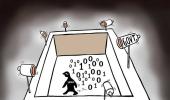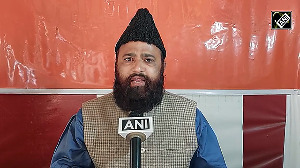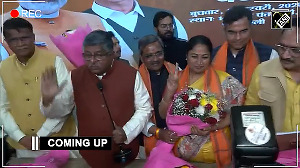‘The major success behind our robust recovery performance has come from our war room.’
‘It is a small set of six-seven people that monitor (NPA) accounts. They help branches and zones on how to crack an account and follow up.’
‘It is relentless.’
Illustration: Uttam Ghosh/Rediff.com

Punjab National Bank has made a name for itself in recovery of bad loan dues.
Usha Ananthasubramanian, managing director and chief executive officer of the government-owned lender, talks to Dilasha Seth and Indivjal Dhasmana on how it has achieved this reputation and other allied matters.
How has PNB managed a good show on non-performing assets, while other public sector banks are struggling?
There are large assets that are consortium-driven, while smaller assets are solely bank-driven.
The major success behind our robust recovery performance has come from our war room.
It is a small set of six-seven people that monitor (NPA) accounts. They help branches and zones on how to crack an account and follow up.
It is relentless.
We also have a very strong group on WhatsApp for recoveries, in which circles and zones post by 9 pm every day about recovery.
Ideally, we are looking at a recovery of ₹34 crore a day.
We name and shame defaulters.
Gandhigiri has also worked very well for us -- our people go to the defaulter and shame him with rosebuds. The entire neighbourhood comes to know about them.
The group has done excellent work.
We have also been looking at assets that can be put up for sale to asset reconstruction companies.
Another approach is to put on sale a lot of properties (held as collateral).
The government is expected to shortly announce an NPA policy. Your broad expectation?
Today, the haircut (term for a writeoff by a bank on its loan) is an unknown animal. You can take 20, 30 or 40 per cent. There needs to be some clarity on this.
Otherwise, the tools of the Reserve Bank are available -- SDR, S4A, others.
Clarity should come on haircuts.
How much haircut do you take when it comes to recovering NPAs?
We do not go below the book dues on the day of NPA (declaration). We try to recover that.
All are provided accounts; so, there is a write-back happening from the profits and the minimum is the book dues.
Is there progress on public sector units taking over the management of stressed assets in their respective sectors, with PSBs (government-owned banks) finding it tough to find promoters?
Nothing has happened yet.
Each PSU has its own problem -- SAIL for steel, NHPC for hydropower, Cochin Shipyard for ships, NTPC for power.
They have their own manpower issues and other problems; nothing much has moved forward.
After taking on NPAs, how do you plan to increase credit? The economy will take time to recover.
We ought to see some good growth in credit. It means inching towards double-digit (growth), not more than that.
There is a lot of MSME (micro, small and medium enterprises) activity, not in manufacturing but in services.
PNB has a very strong agriculture background, with 16 per cent of our branches in rural and semi-rural areas. Today, agriculture is panning out very differently and that helps us.
In addition, there is demand in retail (individual accounts).
With banks flush on liquidity after demonetisation, what is the way to suck out the excess?
Everyone is talking about the (proposed) standing deposit facility. It will become one more tool in the hands of the RBI.
Earlier, this was managed but this is an opportunity to look at a new instrument.
After consolidation in State Bank of India, do you see any more synergies for consolidation in the banking space? Where do you find your bank in this regard?
One part of consolidating is when your DNA is the same; it is easier to do.
Consolidation with respect to a smaller bank merging with a larger one does not make much sense.
Basically, the resultant entity should be large enough to give it a size.
What non-core assets might you offload?
We have very few non-core assets to offload.
We stand invested in PNB Housing, for instance, a listed company. After the lock-in period that ends in November, it is one good asset we plan to sell.
Then, there is UTI Mutual Fund, for which we have to decide the next step forward.
We also have PNB Gilts, the only listed primary dealer in India. There is enough room to offload.
In PNB Metlife, we are on a shareholders’ agreement, so it does not work right away.
Will you sell a seven per cent stake in PNB Housing Finance?
We will only be able to take a call after November, looking at the valuation and requirement, on whether we need to sell five, seven or eight per cent.
With respect to UTI, are there plans to sell the stake to SBI or a foreign partner?
All of us are equal shareholders. So, it will be a collective call of all stakeholders.
We are not here to divest or give it to anyone.
We will come to a common understanding and then take a call, on whether it will be an IPO or shedding a part of it.












 © 2025
© 2025